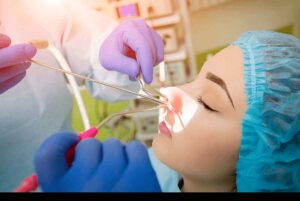How Do You Deal With GERD?

Gastroesophageal reflux disease (GERD) is a chronic condition that affects the digestive system. It occurs when stomach acid flows back into the esophagus and causes irritation.
This backward flow is due to a weakened lower esophageal sphincter (LES). LES is the muscle that prevents stomach contents from rising.
GERD is more than occasional heartburn but a persistent issue that, if left untreated, can damage your esophagus and cause wide-ranging complications. Read more: https://gastrohealth.com.sg/condition/gastroesophageal-reflex-diesease-gerd/.
Now, anyone can develop GERD. However, there some groups of people who are at a higher risk of developing this condition.
Factors like obesity, pregnancy, and smoking can increase your risks of experiencing GERD symptoms. Also, if you frequently consume spicy foods, caffeine, or alcohol, you may have a higher risk of developing this condition.
It is also worth mentioning that some medical conditions, like hiatal hernias, can contribute to GERD. The most common symptoms include heartburn, regurgitation, chest pain, difficulty swallowing, and a chronic cough.
Some patients experience symptoms primarily at night, a situation which may lead to poor sleep and reduced quality of life. On this page we will answer one of the most frequently asked questions about GERD which is; how do you deal with GERD? Let’s begin!
How Is GERD Usually Treated?
Your GP may refer you to a specialist for GERD treatment if you get symptoms which persist despite medication. Also, you may be referred to a gastroenterologist if your symptoms only seem to worsen over time.
Now, GERD treatment depends on the severity of symptoms. Most likely, your doctor will start with lifestyle changes before moving on to medications. If symptoms persist despite these measures, you may be recommended surgery. Here’s what you need to know about these treatment approaches for GERD;
Lifestyle Changes
For many people with GERD, small adjustments in daily habits are all they need to reduce GERD symptoms. These changes target the root cause—acid reflux—by minimizing pressure on the stomach and strengthening the LES. If you’re recommended lifestyle changes, here are the things you may need to do;
- Lose Weight: Excess weight increases pressure on the stomach. This excess pressure can force acid upward into your esophagus and lead to GERD. Losing even a few kilograms can significantly reduce the symptoms you’re getting.
- Elevating your Head During Sleep: Lying flat allows acid to move more easily into the esophagus. However, when you raise the head of your bed with a foam wedge or extra pillows, you can prevent nighttime reflux.
- Quitting Smoking: You probably already understand that smoking is harmful to your health. But did you also know that it specifically weakens the LES and increases stomach acid production? If you smoke, stopping this habit can improve your GERD symptoms and overall health.
- Dietary Adjustments: When it comes to dietary adjustments, it may help to avoid acidic, spicy, and fatty foods. Those adjustments can help reduce symptoms. You are also advised to eat smaller meals, avoid late-night snacking, and chew food slowly.
Medications
Beyond lifestyle adjustments, medication is a key part of GERD treatment. There are several drug classes that can help control acid production and reduce symptoms. Key among these include;
- Antacids: These provide quick relief by neutralizing stomach acid. However, they do not heal the esophagus and should not be used as a long-term solution. Overuse may cause side effects like diarrhea or constipation.
- H2 Blockers: These reduce acid production and promote healing of the esophagus. While less effective than proton pump inhibitors (PPIs), they can be useful for mild to moderate GERD. They are available over the counter or by prescription.
- Proton Pump Inhibitors (PPIs): These are the most effective medications for GERD. PPIs reduce stomach acid production significantly which then allows the esophagus to heal. Long-term use may have risks, including an increased chance of infections like C. difficile. However, when used under medical supervision, they are generally safe.
Surgery and Medical Procedures
If you do not respond to medication or wish to avoid long-term drug use, your gastroenterologist may recommend surgery for your GERD treatment. Here are some treatment options that might help;
- Fundoplication: This is the most common surgery for GERD. For this procedure, the surgeon will wrap the top part of the stomach around the lower esophagus to strengthen the LES. It can be performed using laparoscopic or open surgery techniques.
- Weight-Loss Surgery: If you’re obese and have GERD, you may benefit from gastric bypass surgery. This procedure helps reduce stomach size to decreases acid production and reflux episodes.
- Endoscopic Procedures: These are minimally invasive treatments. Some involve tightening the LES with sutures, while others use radiofrequency energy to improve LES function. These procedures are not widely used but may be an option for select patients.
How Long Does GERD Take to Heal?
Dealing with GERD can be frustrating so once you’ve began treatment you may be itching to ask; how long does GERD take to heal? The simple answer is that the duration of GERD treatment depends on the severity of symptoms and the chosen treatment method.
In fact, without treatment, GERD is often a lifelong condition. However, with proper management, most patients experience symptom relief within days or weeks.
If you’re seeking treatment for mild GERD, the symptoms may improve within a few days of starting lifestyle changes or over-the-counter medications. For moderate GERD characterized by persistent symptoms, prescription medications like PPIs may take several weeks to provide full relief.
If you have long-term esophageal damage, you may need months of treatment. In some cases, surgery may be recommended for lasting relief.
It is crucial to continue treatment even after symptoms improve. You do not want to stop medication too soon as this may cause a relapse. Some patients may need long-term maintenance therapy, especially if lifestyle changes alone are insufficient.
The Bottom Line
Managing GERD is essential for long-term health and quality of life. Whether through lifestyle changes, medications, or medical procedures, the right treatment can help prevent complications and restore comfort.
Do not wait for symptoms to worsen. If you experience persistent digestive discomfort, seek professional advice. If you’re in Singapore, contact our gastroenterology clinic today to schedule a consultation. Call or visit us at;
Gastrohealth Clinic @ Gleneagles – Dr Bhavesh Doshi | Gastroscopy | Colonoscopy | Health Screening | EUS and ERCP Singapore
6A Napier Rd, #05-35C Gleneagles Hospital Annexe Block, Singapore 258500
Phone: +65 6355 5773







